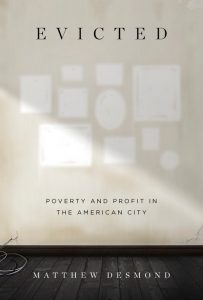By Kate Scott, Director of Fair Housing
 Earlier this month, Harvard sociologist and MacArthur genius Matthew Desmond published Evicted: Poverty and Profit in the American City. Using mixed social science research methods, Desmond explores the pervasiveness of eviction in American cities and posits that eviction is, in itself, a cause of poverty. The book is written in a style that makes it easy to read. It humanizes its subjects- both families that are experiencing eviction and its rippling effects, along with the landlords doing the evicting. For these reasons alone, the book is worth a read. But supporters of fair housing should also engage the subject matter because Desmond does an excellent job articulating the various ways in which evictions and housing discrimination intersect:
Earlier this month, Harvard sociologist and MacArthur genius Matthew Desmond published Evicted: Poverty and Profit in the American City. Using mixed social science research methods, Desmond explores the pervasiveness of eviction in American cities and posits that eviction is, in itself, a cause of poverty. The book is written in a style that makes it easy to read. It humanizes its subjects- both families that are experiencing eviction and its rippling effects, along with the landlords doing the evicting. For these reasons alone, the book is worth a read. But supporters of fair housing should also engage the subject matter because Desmond does an excellent job articulating the various ways in which evictions and housing discrimination intersect:
1) In recent years, Desmond’s work has drawn attention from some because he clearly articulated the disparate impact that evictions have on Black women. In Evicted, he writes, “Poor black men were locked up. Poor black women were locked out”*, citing the fact that in Milwaukee’s poorest Black neighborhoods, women were evicted twice as often as men and nine times as often as women from the its poorest white neighborhoods. There have been recent exciting developments and ongoing work when it comes to limiting the collateral consequences of mass incarceration on the lives of Black men. Advocates should also implement strategies to mitigate the disparate impact that eviction has on Black women, while not losing site of the fact that Black women also experience incarceration at disproportionate rates.
2) Desmond’s research reveals a stunning amount of discrimination against poor families with children. For example, his analysis of Milwaukee eviction records revealed that the “effect of living with children on receiving an eviction judgment is equivalent to falling four month behind in rent.” Illegal discrimination against families with children is a fact of life that the real life characters in Evicted have to work around on a daily basis- mothers misrepresent how many children they have and make promises that they often can’t keep regarding their kids’ good behavior just to secure unsafe, overpriced housing in Milwaukee’s lowest opportunity neighborhoods. Facts such as these point to the need for amplified, robust strategies to enforce the Fair Housing Act’s familial status protections.
3) Brilliant enforcement and advocacy strategies from around the country in recent years have shone a spotlight on the seemingly unintended consequences that nuisance ordinances have had on victims of domestic violence (and by extension, via a disparate impact analysis, women). Desmond’s research also reveals that such ordinances, at least in Milwaukee, may have a disparate impact based on race because the incidence of properties that could have received a nuisance citation and actually did receive one was much higher in poor Black neighborhoods than it was in white ones (1 in 16 vs. 1 in 41 respectively). As fair housing advocates, we should take such a racially disparate impact into account moving forward.
Overall, Desmond’s latest work deserves our attention as fair housing advocates. Read in companion with an entire cannon of Black feminist theory and scholarship, it serves to remind us that centering the experiences of those most marginalized by all forms of discrimination is the best way to sharpen our impact.
The Evicted website is available here. An excerpt in The New Yorker is available here.
*In reality, this is an oversimplification. While I appreciate the focus on how Black women in particular experience eviction, it is critical to remember that they also experience the “locked out” part of the statement to a degree that is vastly disproportionate to their white counterparts.

